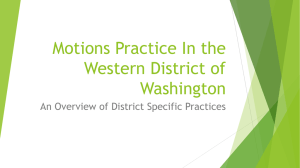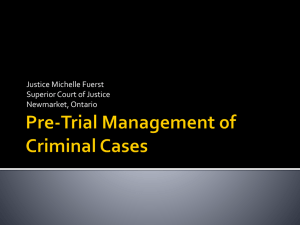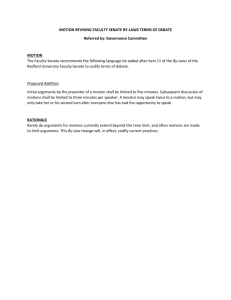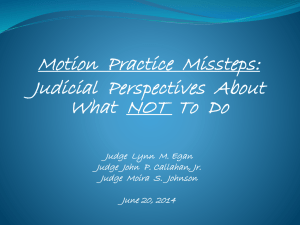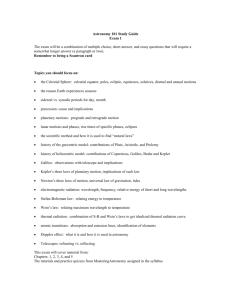Standing Order for Calendar 61-Associate Judge Mathias W. Delort
advertisement
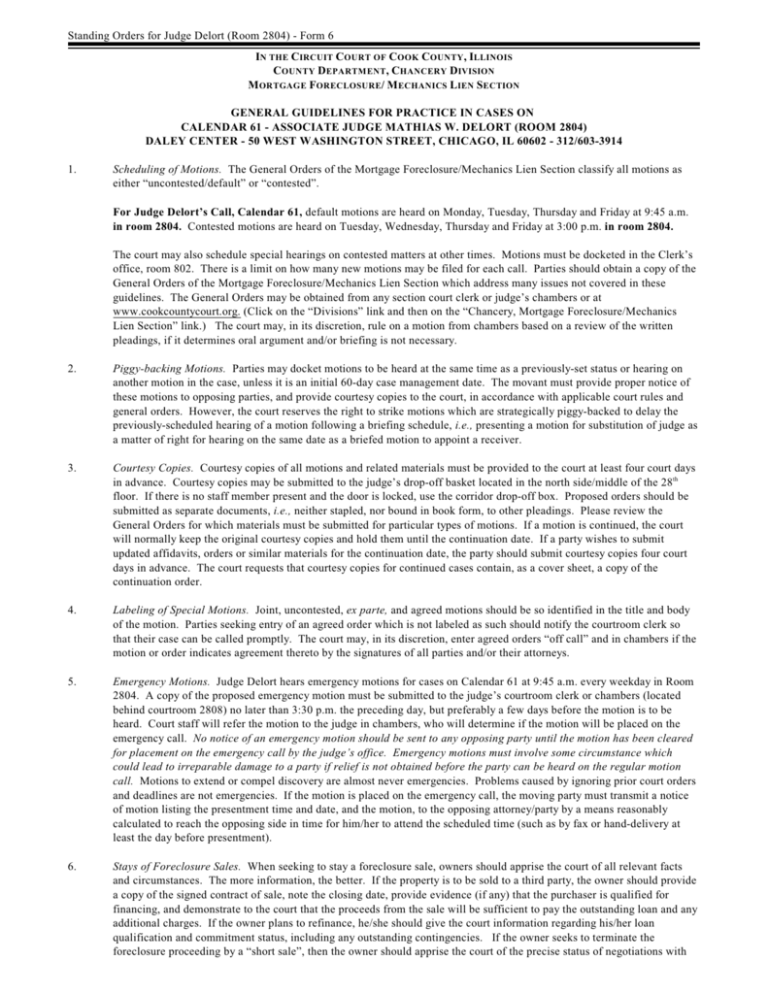
Standing Orders for Judge Delort (Room 2804) - Form 6 IN T H E CIR C U IT COURT OF COOK COUNTY , ILLINOIS COUNTY DEPARTMENT, CHANCERY DIVISION M ORTGAGE FORECLOSURE/ M ECHANICS LIEN SECTION GENERAL GUIDELINES FOR PRACTICE IN CASES ON CALENDAR 61 - ASSOCIATE JUDGE MATHIAS W. DELORT (ROOM 2804) DALEY CENTER - 50 WEST WASHINGTON STREET, CHICAGO, IL 60602 - 312/603-3914 1. Scheduling of Motions. The General Orders of the Mortgage Foreclosure/Mechanics Lien Section classify all motions as either “uncontested/default” or “contested”. For Judge Delort’s Call, Calendar 61, default motions are heard on Monday, Tuesday, Thursday and Friday at 9:45 a.m. in room 2804. Contested motions are heard on Tuesday, Wednesday, Thursday and Friday at 3:00 p.m. in room 2804. The court may also schedule special hearings on contested matters at other times. Motions must be docketed in the Clerk’s office, room 802. There is a limit on how many new motions may be filed for each call. Parties should obtain a copy of the General Orders of the Mortgage Foreclosure/Mechanics Lien Section which address many issues not covered in these guidelines. The General Orders may be obtained from any section court clerk or judge’s chambers or at www.cookcountycourt.org. (Click on the “Divisions” link and then on the “Chancery, Mortgage Foreclosure/Mechanics Lien Section” link.) The court may, in its discretion, rule on a motion from chambers based on a review of the written pleadings, if it determines oral argument and/or briefing is not necessary. 2. Piggy-backing Motions. Parties may docket motions to be heard at the same time as a previously-set status or hearing on another motion in the case, unless it is an initial 60-day case management date. The movant must provide proper notice of these motions to opposing parties, and provide courtesy copies to the court, in accordance with applicable court rules and general orders. However, the court reserves the right to strike motions which are strategically piggy-backed to delay the previously-scheduled hearing of a motion following a briefing schedule, i.e., presenting a motion for substitution of judge as a matter of right for hearing on the same date as a briefed motion to appoint a receiver. 3. Courtesy Copies. Courtesy copies of all motions and related materials must be provided to the court at least four court days in advance. Courtesy copies may be submitted to the judge’s drop-off basket located in the north side/middle of the 28th floor. If there is no staff member present and the door is locked, use the corridor drop-off box. Proposed orders should be submitted as separate documents, i.e., neither stapled, nor bound in book form, to other pleadings. Please review the General Orders for which materials must be submitted for particular types of motions. If a motion is continued, the court will normally keep the original courtesy copies and hold them until the continuation date. If a party wishes to submit updated affidavits, orders or similar materials for the continuation date, the party should submit courtesy copies four court days in advance. The court requests that courtesy copies for continued cases contain, as a cover sheet, a copy of the continuation order. 4. Labeling of Special Motions. Joint, uncontested, ex parte, and agreed motions should be so identified in the title and body of the motion. Parties seeking entry of an agreed order which is not labeled as such should notify the courtroom clerk so that their case can be called promptly. The court may, in its discretion, enter agreed orders “off call” and in chambers if the motion or order indicates agreement thereto by the signatures of all parties and/or their attorneys. 5. Emergency Motions. Judge Delort hears emergency motions for cases on Calendar 61 at 9:45 a.m. every weekday in Room 2804. A copy of the proposed emergency motion must be submitted to the judge’s courtroom clerk or chambers (located behind courtroom 2808) no later than 3:30 p.m. the preceding day, but preferably a few days before the motion is to be heard. Court staff will refer the motion to the judge in chambers, who will determine if the motion will be placed on the emergency call. No notice of an emergency motion should be sent to any opposing party until the motion has been cleared for placement on the emergency call by the judge’s office. Emergency motions must involve some circumstance which could lead to irreparable damage to a party if relief is not obtained before the party can be heard on the regular motion call. Motions to extend or compel discovery are almost never emergencies. Problems caused by ignoring prior court orders and deadlines are not emergencies. If the motion is placed on the emergency call, the moving party must transmit a notice of motion listing the presentment time and date, and the motion, to the opposing attorney/party by a means reasonably calculated to reach the opposing side in time for him/her to attend the scheduled time (such as by fax or hand-delivery at least the day before presentment). 6. Stays of Foreclosure Sales. When seeking to stay a foreclosure sale, owners should apprise the court of all relevant facts and circumstances. The more information, the better. If the property is to be sold to a third party, the owner should provide a copy of the signed contract of sale, note the closing date, provide evidence (if any) that the purchaser is qualified for financing, and demonstrate to the court that the proceeds from the sale will be sufficient to pay the outstanding loan and any additional charges. If the owner plans to refinance, he/she should give the court information regarding his/her loan qualification and commitment status, including any outstanding contingencies. If the owner seeks to terminate the foreclosure proceeding by a “short sale”, then the owner should apprise the court of the precise status of negotiations with 6 cont. both the lender and the purchaser and provide a copy of the short sale agreement signed by the lender. Owners seeking stays should also provide basic information such as the property address and the foreclosure case history, including when the case was filed, when the defendants were served, when the foreclosure order was entered, the originally-scheduled sale date, whether the sale will fall outside the publication date, and whether any previous stays were entered. If a bankruptcy case is at issue, the owner should give the court information regarding that case, including at least the case number, but preferably a full docket report. 7. Self-Represented Litigants. A party who represents him/herself without an attorney is a “pro se” party. A party’s selfrepresented classification provides no special legal status, and the party must comply with established rules of court procedure, including the rules on how to prepare pleadings found in the Illinois Code of Civil Procedure and Illinois Supreme Court rules in the same manner as required of licensed attorneys. These rules are on the internet at www.ilga.gov and www.state.il.us/court/SupremeCourt/Rules and are available in book form in the Cook County Law Library on the 29th floor of the Daley Center. Neither the judge, the judge’s staff, nor the opposing attorney can provide legal advice to selfrepresented parties. The judge will provide a list of free and low-cost legal agencies on request. The Chancery Division Help Desk in room 1303 of the Daley Center also provides advice to self-represented parties. The judge cannot speak to litigants directly except in open court upon proper motion and notice to all parties. The judge’s staff is only allowed to provide limited information regarding a case, such as upcoming court dates and times. 8. Court Reporters and Foreign Language Interpreters. This section of the court does not have a staff of official court reporters. Accordingly, parties wishing a record of arguments or testimony should obtain their own private court reporter. In extraordinary circumstances, and with prior notice, the court can obtain the services of an official reporter. The court staff at the Daley Center includes Spanish and Polish interpreters who are called when needed. Interpreters for other languages can be obtained with prior notice to court staff by calling 312/603-3914. 9. Order of Calling Cases. As a general rule, cases on the default call are sorted by plaintiff’s law firm. The law firms, in turn, are sorted so that firms having one or only a few cases are called first, and law firms having many cases are called last. Cases filed by firms with a large number of cases are then sorted by alphabetical order of the last name of the owner. When practicable, parties who have checked in with the courtroom clerk will be moved to the front of the cases called for that law firm. On contested calls, cases are generally sorted by complexity, so that agreed orders are called first, matters requiring less time are called next, and fully-briefed contested matters requiring more time or extended arguments are called last. 10. Deceased Mortgagors. Plaintiffs who wish to name a special representative in cases where a mortgagor is deceased and no estate has been opened should review Supervising Judge Meacham’s memorandum of October, 2007, which outlines the required procedures. See also ABN AMRO Mortgage Group, Inc. v. McGahan, 237 Ill. 2d 526 (2010). 11. Receivers. Motions to appoint a receiver should be accompanied, at a minimum, by copies of the complaint, mortgage and note; resume/background information of the proposed receiver including his/her rates/compensation; a suggested bond amount based on twice the expected monthly income from the property; proof of service of either the complaint or the motion on the defendants in the manner required by section 15-1706(d) of the IMFL; and a proposed order following the form available for download from the Chief Judge’s web site, www.cookcountycourt.org. (Click on the “Divisions” link and then on the “Chancery, Mortgage Foreclosure/Mechanics Lien Section” link.) The same web site has detailed instructions for receivers appointed by the foreclosure judges. Once the court establishes a bond amount and the bond is obtained, the movant shall submit the bond and three copies thereof to chambers for final approval. The receiver will be required to submit an initial report of income and expenses approximately 60 days from the date of appointment, and similar reports covering sixty-day cycles thereafter. Each report shall be submitted for court approval by motion either on a noticed date or on a previously-set status date. The usual notice and courtesy copy rules apply to receivers’ reports. Only individual natural persons, as opposed to companies, will be appointed as receivers. 12. Opinions. Judge Delort’s written opinions are available for reference on the Westlaw IL-TRIALORDERS database. 13. Piecemeal Defaults. The court disfavors defaulting parties without simultaneously entering an order of foreclosure and sale. Piecemeal defaults will only be entered for compelling reasons. Revised January, 2012 2
